“Hey Alexa, did I take my pills today?” One student wants to help the elderly remember to take their medications and maybe save a life

For many elderly Americans, missing a scheduled medication can be life-threatening. According to AgingCare.com, approximately 200,000 seniors are hospitalized each year due to adverse drug reactions, with 55% taking their medications incorrectly. Om Guin, from Roswell, Georgia wanted to find a solution to help seniors remember to take their medications on time.
Om created a voice-enabled smart pillbox, which allows users to ask the pillbox if they’ve taken their medication for the day. While Om knew similar pillboxes had been developed, he wanted his pillbox to be inexpensive, allowing it to be an accessible device for any household.
Om put a lot of thought into the best way to engineer this device in order to make it helpful for people everywhere. Using a tactile button sensor, Om placed a plate over the sensor and filled the empty space around a pill with semi-stiff foam to allow for better pill pressure detection when the lid is closed. If a pill is detected in the pillbox after the scheduled medication time, an alarm goes off and an email is sent to the user’s caregiver, alerting the user of a missed dose. If a user needs to change their medication schedule, the voice recognition allows them to change the time of their alerts by speaking directly to the pillbox.

Using Raspberry Pi, Om programmed a voice recognition interface. “The pillbox itself works like an Alexa device, listening and speaking back to the user. All the user needs is an Amazon account, which they can create for free,” he says. Om noted that his device could also be used with the Google Assistant, which is similar to an Alexa.
In its current design, the pillbox needs to be powered by a micro-USB cable, through either a rechargeable battery pack or a USB charger plugged into a power outlet. Om says using a rechargeable battery pack gives the device up to 24 hours of reserve power, in case of a power outage and allows the device to be moved without turning it off.
“I am considering applying for a patent,” says Om. “In my spare time, I have been doing some work to add a weight sensor to the device and calibrate it to sense small changes in the weight of a bottle of liquid medicine, to detect when the user takes a dose of medicine. This will expand its usage beyond solid pills to liquid medicine.”
Om, who received the Lemelson Early Inventor Prize for his work at the Fulton County Regional Science & Engineering Fair, said getting this recognition motivates him to continue working to improve the lives of people with memory challenges.


